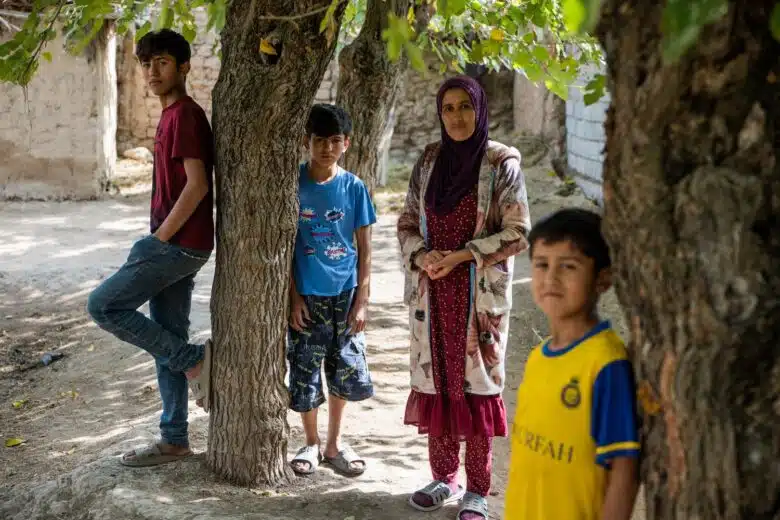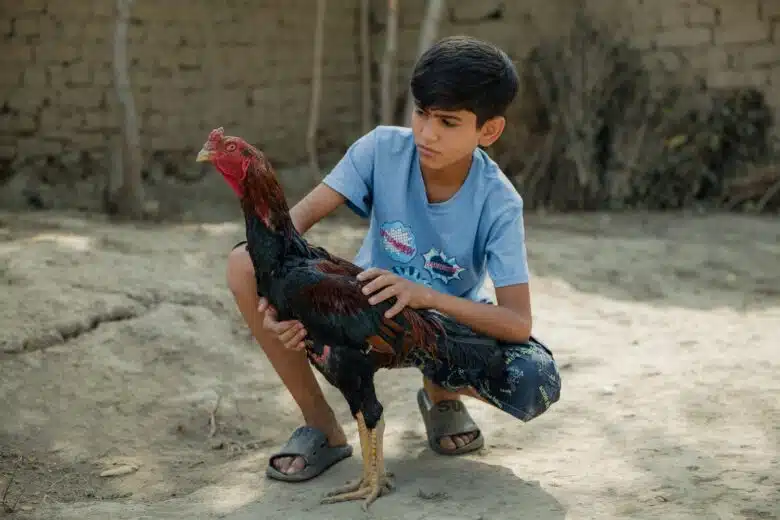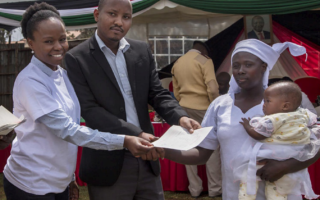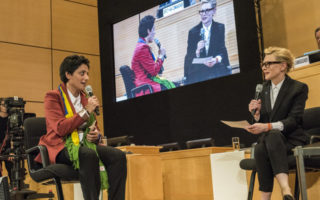
Adolat Shabozova lacked nationality in Tajikistan, despite being born there. When her three sons were born, they too were stateless.© UNHCR/Elyor Nemat
After living on the margins of society for most of their lives, nearly 220,000 people have been granted nationality by Central Asian states over the past decade.
By Radhika Bhatnagar in Kulob, Tajikistan
For the first 34 years of her life, Adolat Shabozova cannot recall a single day when she was truly at peace. “I was always in constant stress. I was worried about where to go and whom to approach,” she said
Adolat was born in 1988 to a poor family in the dusty, mountainous city of Kulob, in southern Tajikistan. Her parents could not afford to pay the fee for official identity documents and so Adolat remained undocumented and stateless for over three decades. When her own children were born, they too were stateless.
Lacking nationality, she struggled to complete her education, find a job or travel freely, and lived in constant anxiety over her children’s futures. Adolat’s story is not unique.
Invisible lives
A decade ago, there were more than 255,000 people who were not recognised as citizens of any of the states in Central Asia, a region that includes Kazakhstan, the Kyrgyz Republic, Tajikistan, Turkmenistan and Uzbekistan.
The majority had been citizens of the former Soviet Union until its collapse in 1991 and had not acquired citizenship of the independent states that came afterwards, while others, such as Adolat, did not have their births registered, mostly due to costs and bureaucratic hurdles.
Without legal nationality, a quarter of a million people were living invisible lives on the margins of society. The lack of official identity documents meant it was an often-impossible struggle to access fundamental rights, services and necessities such as education, healthcare, employment and housing, or to travel or participate in elections.
Watch the video:
© UNHCR
Despite the challenges, Adolat managed to get a primary school education and later married and had three children. But when her husband was diagnosed with tuberculosis, Adolat had to become the family breadwinner.
“It was very hard for me to get employed,” she said. “I went door-to-door approaching people, looking for opportunities.”
Without legal identity, formal employment was impossible, and eventually Adolat found the only job she could: casual work washing dishes at weddings. “You feel depressed. You feel empty from the inside. Wherever you go, you are asked for documentation,” she said.
After many false starts and dead ends, Adolat was eventually referred to Chashma, a non-governmental partner organization of UNHCR, the UN Refugee Agency, that offers free legal support to vulnerable groups, including stateless people. Chashma helped Adolat navigate the process of applying for her identity documents, and in 2022 she received her Tajikistan passport, ending decades of anxiety and uncertainty.
“Now that I have documents, I can achieve anything,” she said. “Both for my children and myself… I am happy. I am always happy.”

Adolat’s son, Muhammad, on the family’s small farm. He and his two brothers now have Tajikistan passports.© UNHCR/Elyor Nemat
Breaking the cycle
Nataliyia Zaretskaya did not know she was stateless until she was 16. Born in the Soviet Union in 1985, she moved to Shymkent in southern Kazakhstan in 1998 with her mother who did not register with the authorities on arrival, leaving them without legal identity.
As a result, Nataliyia could not enrol in secondary education nor get a job, and her children were also left legally stateless.
Nataliyia was determined to obtain citizenship, for herself and her children, but the journey was to prove long and frustrating.
“Everywhere, you have to prove that you are a person, and they look at you as if it’s your fault that you are without documents. You are nothing and everyone says it’s not their problem!” she said.
After several fruitless visits to migration officials, Nataliyia was introduced to UNHCR partner organization Sana Sezim, marking the start of a seven-year legal effort to obtain identity documents.
Nataliyia at last became a citizen of Kazakhstan in 2024. “The first thing I did was to draw up the identity documents of my children. Right away! I emphasized that I am a mother with citizenship, that I am a person.”
Building momentum
Over the past decade, driven by UNHCR’s #IBelong advocacy campaign to end statelessness and government commitments, Central Asian states have resolved more than 218,000 cases of statelessness on their territories, including those of Adolat and Nataliyia. Today, one third of all resolved cases of statelessness globally are in Central Asia.
But reaching this landmark achievement has been neither easy nor straightforward. “UNHCR’s work on ending statelessness in this region varies for each country,” said Sergiu Gaina, a statelessness officer with UNHCR. He explained that different laws and procedures mean different solutions are needed in different countries.
The Kyrgyz Republic took a bold and important step in 2019, passing a law granting nationality to all undocumented people, and in so doing became the first country in the world to end all known cases of statelessness on its territory. The achievement was partly thanks to UNHCR and partners such as Fergana Valley Lawyers Without Borders, led by Nansen Refugee Award global laureate Azizbek Ashurov.
In November 2024, Turkmenistan announced that it too had ended all known cases of statelessness.
With the conclusion of the #IBelong campaign in November 2024, UNHCR announced the new Global Alliance to End Statelessness.
“We are encouraging all countries in the region to join the alliance as they have a lot of good practices to share with the rest of the world,” Gaina said. “Everyone should know who stateless people are, what are the problems they face and how they can help support them.”
Adolat and Nataliyia are among the many individuals whose lives have been transformed thanks to the concerted efforts to end statelessness in Central Asia.
“Now that I have citizenship, I can go places and achieve things that were impossible when I was stateless,” said Adolat. “I have a dream of using my documentation to help my children to build their future.”





